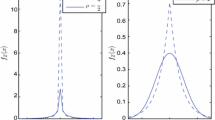Abstract
In this paper, a new and novel Reward-Punishment-based Variable Step Size Least Mean Square (RP-VSSLMS) algorithm has been proposed and a novel methodology is used to construct a Rayleigh fading channel adaptive equalizer employing the proposed algorithm in hardware domain. As the Rayleigh fading channel reveals the property of real-time wireless communication environment, it is chosen here. The Spartan 6 FPGA board is configured here to model the digital circuitry of the proposed RP-VSSLMS algorithm using a novel “Hardware Co-simulation” technique. The hardware co-simulation analysis showed that, the proposed RP-VSSLMS algorithm has faster convergence speed, smaller steady-state misadjustment, and lesser computational complexity than the existing LMS and VSSLMS algorithms. The performance of the proposed algorithm is observed by calculating the Bit Error Rate (BER) of different modulated signals under Rayleigh Fading channel.
Similar content being viewed by others
References
Schizas, ID., Mateos, G., Giannakis, GB.: Distributed LMS for Consensus-Based in-Network Adaptive Processing. IEEE Trans. Signal Process. 57(6) (2009) 2365–2382.
Widrow, B., McCool, J.M., Larimore, M., Johnson, C.R.: Stationary and non-stationary learning characteristics of the LMS adaptive filter. Proc IEEE. 64(8) (1976) 1151–1162.
Haykin, S.: Adaptive Filter Theory. 4th edn. Prentice-Hall, Englewood Cliffs (2000).
Kwong, RH., Johnston, EW.: A variable Step Size LMS Algorithm. IEEE Trans. Signal Process. 40(7) (1992) 1633–1642.
Bose, S., Mondal, A., Misra, IS.: FPGA Based Hardware Implementation of Adaptive Equalizer for Rayleigh Fading Channel. In Proc. of the ICMOCE, Bhubaneswar (2015) 338–341.
Lapidoth, A., Shamai (Shitz), S.: Fading channels: How Perfect Need Perfect Side Information be?. IEEE Trans. Inf. Theory. 48 (2002) 1118–1133.
Baddour, K.E., Beaulieu, N.C.: Autoregressive Modeling for Fading Channel Simulation. IEEE Trans. Wireless Commun. 4(4) (2005) 1650–1662.
Aboulnasr, T., Mayyas, K.: A Robust Variable Step-Size LMS-Type Algorithm: Analysis and Simulations. IEEE Trans. Signal Process. 45(3) (1997) 631–639.
Costa, MH., Bermudez, JCM.: A Robust Variable Step-Size Algorithm for LMS Adaptive Filters. In Proc. of the ICASSP, Toulouse (2006) 93–96.
Kang, R.H., Johnstone, E.W.: A variable Step Size LMS algorithm. IEEE Trans. Signal Process. 40(7) (1992) 1633–1642.
Author information
Authors and Affiliations
Corresponding author
Editor information
Editors and Affiliations
Rights and permissions
Copyright information
© 2018 Springer Nature Singapore Pte Ltd.
About this paper
Cite this paper
Bose, S., Misra, I.S. (2018). FPGA-Based Equalizer Design Using a Novel Adaptive Reward-Punishment VSSLMS Algorithm for Rayleigh Fading Channel. In: Sa, P., Sahoo, M., Murugappan, M., Wu, Y., Majhi, B. (eds) Progress in Intelligent Computing Techniques: Theory, Practice, and Applications. Advances in Intelligent Systems and Computing, vol 719. Springer, Singapore. https://doi.org/10.1007/978-981-10-3376-6_58
Download citation
DOI: https://doi.org/10.1007/978-981-10-3376-6_58
Published:
Publisher Name: Springer, Singapore
Print ISBN: 978-981-10-3375-9
Online ISBN: 978-981-10-3376-6
eBook Packages: EngineeringEngineering (R0)




